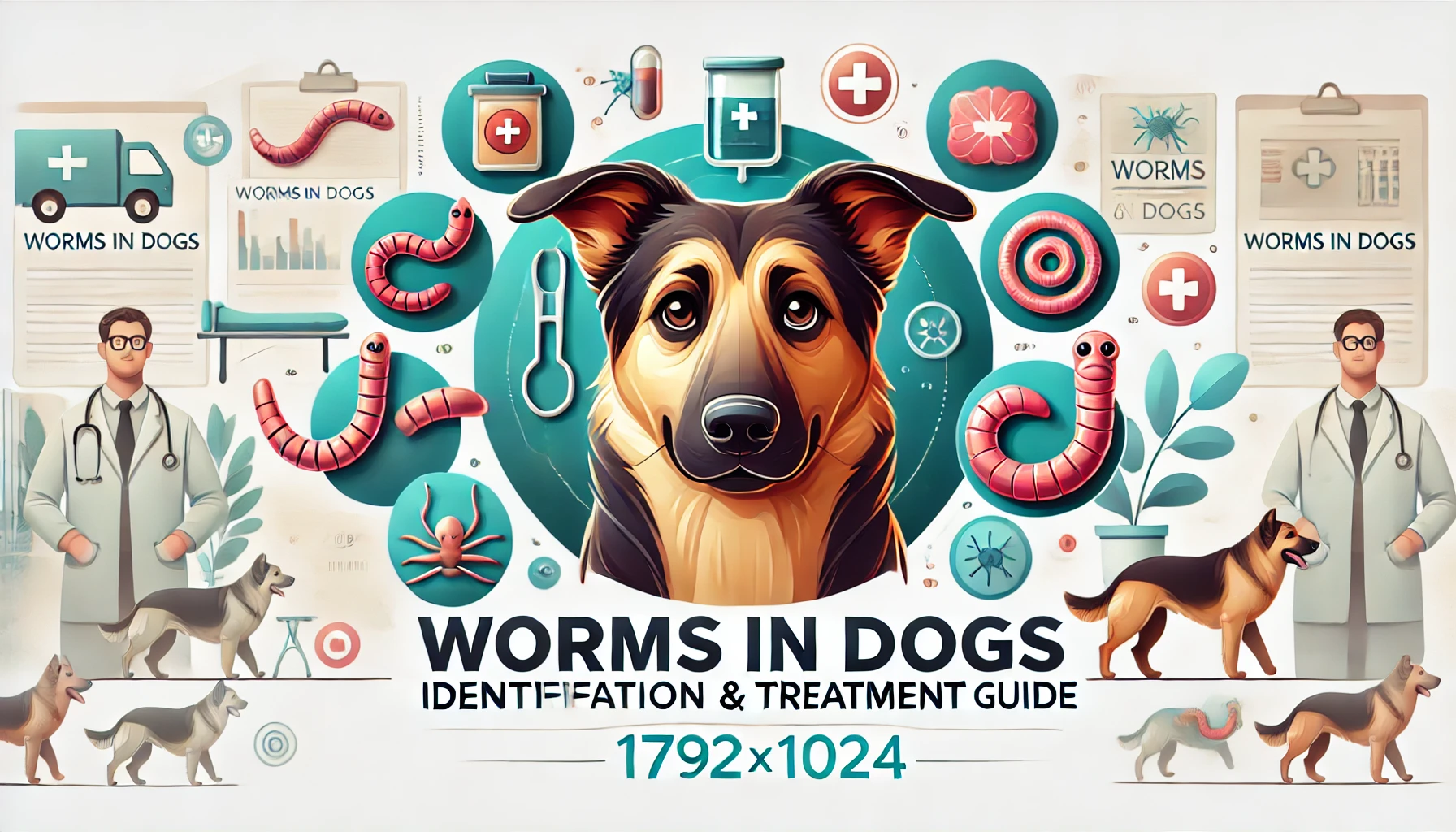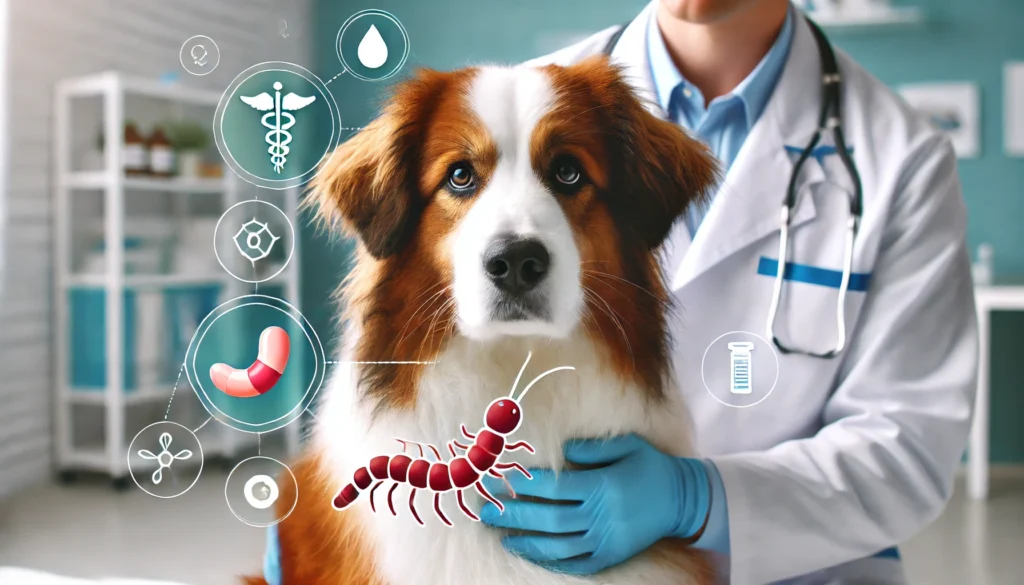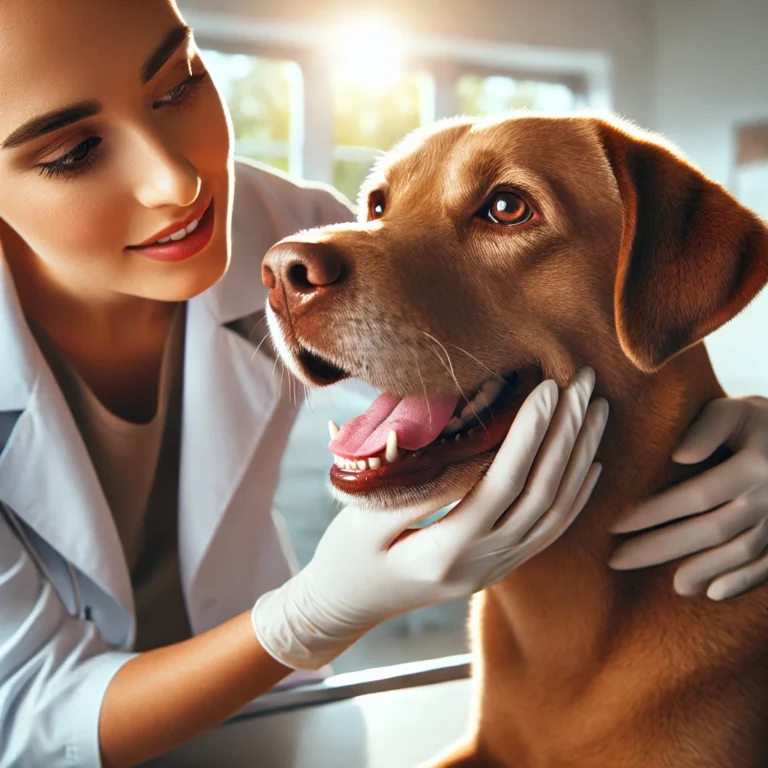Worms in Dogs: 10 Essential Ways to Identify and Treat Fast!

Worms in dogs are a common health issue that can seriously affect your pet’s well-being if left untreated. From tiny puppies to adult dogs, worms can cause various symptoms, from weight loss and digestive upset to more severe health complications. Knowing how to identify, treat, and prevent worms in dogs can make all the difference in ensuring your dog stays healthy and happy.
In this article, we’ll explore the different types of worms in dogs, the signs and symptoms to watch for, and effective treatments and preventive measures. Whether you’re a new dog owner or experienced with pets, these insights will help you protect your dog from harmful worms and ensure their long-term health.
Types of Worms in Dogs
Dogs can contract several types of worms, each with unique symptoms and risks. Recognizing the specific type of worm in your dog is essential for effective treatment. Here’s a look at the most common types of worms in dogs:
1. Roundworms
Roundworms are one of the most prevalent worms in dogs, particularly in puppies. They look like long, spaghetti-like strands and can often be seen in dog feces or vomit.
- Symptoms: Bloated belly, weight loss, vomiting, and diarrhea. Puppies may also appear sluggish or weak.
- Transmission: Dogs can get roundworms by ingesting roundworm eggs from the environment or by consuming infected prey, like rodents.
2. Tapeworms
Tapeworms are flat, segmented worms that attach to a dog’s intestines. You may notice small, rice-like segments of the tapeworm around the dog’s anus or in its stool.
- Symptoms: Scooting or dragging their rear end, weight loss, and mild digestive issues.
- Transmission: Dogs typically get tapeworms by ingesting infected fleas or eating raw meat from infected animals.
3. Hookworms
Hookworms are tiny, thread-like worms that latch onto the intestinal wall and feed on the dog’s blood, potentially causing severe anemia.
- Symptoms: Lethargy, pale gums, weight loss, and bloody stool.
- Transmission: Hookworms can penetrate a dog’s skin, or dogs can ingest the larvae from contaminated soil or feces.
4. Whipworms
Whipworms are slender worms with a whip-like shape that burrow into the large intestine, causing irritation and inflammation.
- Symptoms: Bloody diarrhea, dehydration, weight loss, and general discomfort.
- Transmission: Dogs contract whipworms from consuming contaminated soil, water, or feces.
5. Heartworms
Heartworms are a severe and potentially fatal type of worm that affects a dog’s heart and lungs. Unlike other worms, heartworms are spread through mosquito bites and can only be detected with blood tests.
- Symptoms: Persistent cough, fatigue, reluctance to exercise, and difficulty breathing.
- Transmission: Mosquito bites transmit heartworm larvae, which develop into adult worms that reside in the heart and lungs.

How to Identify Worms in Dogs
Identifying worms in dogs early is essential to prevent further health complications. Here are common signs to watch for, along with some specific ways to identify different types of worms in your dog.
1. Visible Signs in Dog Poop
One of the easiest ways to detect worms in dogs is by inspecting their stool. Here are some specific indicators for each type of worm:
- Roundworms: Look for long, spaghetti-like worms in the stool.
- Tapeworms: Watch for small, rice-like segments in the stool or around the anus.
- Hookworms and Whipworms: While these worms are not usually visible, they may cause dark, tarry stools due to intestinal bleeding.
- Heartworms: These worms are typically not visible in stool and require a vet’s diagnosis.
2. Physical Symptoms
Worms can cause a range of physical symptoms in dogs. If you notice any of these signs, it may indicate a worm infestation:
- Bloated Belly: Especially common in puppies, a swollen abdomen can signal roundworms.
- Weight Loss: Worms consume nutrients meant for the dog, leading to unexplained weight loss.
- Lethargy: Fatigue and lack of energy are common symptoms of worms, particularly if your dog has hookworms or heartworms.
- Coughing: Persistent coughing may indicate a heartworm infection, as the worms affect the lungs and heart.
- Scooting or Itching: Dogs may drag their rear on the floor to relieve the irritation caused by tapeworms.
3. Behavioral Changes
In addition to physical symptoms, worm infestations can cause behavioral changes in dogs:
- Decreased Appetite: Dogs with worms may lose their appetite due to intestinal discomfort.
- Digestive Issues: Vomiting and diarrhea are common, especially with roundworms and hookworms.
- Increased Thirst: Dogs with a severe hookworm infection may experience dehydration, leading to excessive thirst.
4. Worm Eggs and Larvae
Some worms lay eggs that can be seen with the naked eye or with a microscope. For example:
- Roundworm and Hookworm Eggs: Though usually microscopic, these eggs may be visible in severe infestations.
- Tapeworm Segments: Often mistaken for worm eggs, tapeworm segments look like small grains of rice around the dog’s anus.
5. Laboratory Tests
For certain types of worms, like heartworms, a veterinarian may need to conduct a blood test or fecal analysis to confirm the presence of parasites. Regular vet check-ups can help identify worms early and prevent serious complications.

How Dogs Get Worms
Understanding how dogs contract worms can help prevent future infestations. Worms are often spread through contact with contaminated environments, other animals, and even certain insects. Here are the most common ways dogs get worms:
1. Ingesting Contaminated Soil or Feces
Dogs often pick up worms by ingesting contaminated soil, water, or other animals’ feces. This method of transmission is especially common for roundworms, hookworms, and whipworms, whose eggs and larvae can survive in soil for extended periods.
- Example: While sniffing or licking outdoor surfaces, a dog might accidentally consume roundworm eggs left in the soil by infected animals.
2. Consuming Infected Prey
Many types of worms can spread when a dog consumes an infected animal, like rodents, birds, or insects. Tapeworms, in particular, are commonly transmitted this way. The infected prey hosts worm larvae, which enter the dog’s system upon ingestion.
- Example: If a dog eats a flea that has ingested tapeworm larvae, the dog can become infected.
3. Contact with Infected Animals
Dogs can contract worms by coming into contact with infected animals. Hookworms and whipworms, for example, can be transmitted through direct contact with infected feces or soil, while puppies can acquire roundworms through their mother.
- Example: If a puppy’s mother is infected, she can pass roundworm larvae to her offspring through her milk or during pregnancy.
4. Mosquito Bites
Heartworms are primarily transmitted through mosquito bites. When an infected mosquito bites a dog, it can inject heartworm larvae into the bloodstream, which then develop into adult heartworms.
- Example: Dogs that spend time outdoors are at a higher risk of mosquito bites, making them more susceptible to heartworm infections, especially in warm or humid climates.
5. Lack of Preventive Care
Dogs that do not receive regular deworming treatments or preventive medications are more susceptible to worms. Many deworming medications work to prevent common parasites, which is essential for reducing infection risks.
- Example: Skipping regular deworming doses or avoiding annual vet visits can increase a dog’s chances of contracting worms.
Did You Know?
Many dog owners wonder, Can dogs eat pineapple? Pineapple is a sweet, tropical treat packed with nutrients for humans, but is it safe for our furry friends? The answer is mostly yes, but with a few important considerations. Pineapple offers several health benefits for dogs, such as vitamins, fiber, and hydration. However, there are also risks, especially if served in excess or in the wrong form.
Treatment Options for Worms in Dogs
Treating worms in dogs promptly and effectively is crucial for your pet’s health. Different types of worms may require specific treatments, so it’s essential to understand the available options and follow your veterinarian’s recommendations. Here are some common treatment methods:
1. Prescription Deworming Medications
Veterinary-prescribed deworming medications are among the most effective options for treating worms in dogs. These medications target specific types of worms, helping to eliminate them from your dog’s system.
- Roundworm and Hookworm Treatments: Medications containing pyrantel pamoate are often prescribed for roundworms and hookworms, effectively paralyzing and expelling these parasites from the body.
- Tapeworm Treatments: Medications like praziquantel are effective for tapeworms, causing the tapeworms to dissolve in the intestines and exit through feces.
- Heartworm Treatments: Treating heartworms is more complex and may involve multiple medications over a period of months, sometimes accompanied by supportive therapies to prevent complications.
Tip: Always consult your veterinarian before administering any deworming medication, as dosage and treatment duration depend on your dog’s age, weight, and specific worm type.
2. Over-the-Counter Dewormers
For minor worm infections, some over-the-counter dewormers may be effective, though they might not cover all worm types, like heartworms. OTC treatments may help treat roundworms and hookworms, but it’s essential to choose products that are safe and effective.
- Example: Look for products labeled for roundworm and hookworm treatments and follow dosage instructions carefully.
- Note: OTC dewormers are best for adult dogs and should not replace veterinarian-approved treatments, especially for puppies or dogs with severe symptoms.
3. Natural and Home Remedies
While deworming medications are usually the most reliable treatment, some natural remedies may provide additional support. However, they may not eliminate the worms entirely.
- Pumpkin Seeds: Raw pumpkin seeds contain cucurbitacin, a compound that may help paralyze worms and aid their expulsion. Small amounts mixed into your dog’s food can sometimes provide mild support for worm prevention.
- Carrots and Coconut Oil: Grated carrots or a small dose of coconut oil in your dog’s food can aid digestion and may help move worms out of the digestive tract.
Warning: Natural remedies are not a substitute for veterinary care and should only be used with professional advice.
4. Lifestyle Adjustments and Hygiene
Maintaining a clean and hygienic environment for your dog can help prevent reinfection during treatment and lower the chances of spreading worms to other pets.
- Frequent Cleaning: Regularly clean your dog’s bedding and toys, and disinfect areas they frequent to reduce parasite spread.
- Sanitary Yard Maintenance: Remove any feces from your yard regularly to limit exposure to worm eggs and larvae.
5. Follow-Up and Preventive Care
After completing the initial treatment, a follow-up visit to the vet is often necessary to confirm that the worms have been entirely eliminated. Routine preventive care, such as monthly deworming or heartworm prevention medications, is also essential.
- Heartworm Prevention: Many monthly heartworm prevention medications also protect against roundworms and hookworms.
- Routine Fecal Exams: Regular stool tests at the vet can help detect any parasites early, even before symptoms appear.
Quick Info: In severe cases, certain worms can cause life-threatening conditions, particularly heartworms, so early and thorough treatment is crucial.
Absolutely, I’ll incorporate a table to enhance the readability and engagement as you requested. Here’s a table summarizing the Types of Worms in Dogs, Their Symptoms, and Common Treatments. This table will provide a quick, at-a-glance reference for readers.
| Type of Worm | Appearance | Symptoms | Common Treatments |
|---|---|---|---|
| Roundworms | Long, spaghetti-like, visible in stool | Bloated belly, weight loss, vomiting, diarrhea | Pyrantel pamoate (prescription or OTC) |
| Tapeworms | Rice-like segments around anus | Scooting, weight loss, mild digestive issues | Praziquantel (prescription or OTC) |
| Hookworms | Tiny, thread-like; rarely visible | Lethargy, pale gums, bloody stool | Pyrantel pamoate, fenbendazole |
| Whipworms | Whip-like, rarely visible | Bloody diarrhea, weight loss, dehydration | Fenbendazole (prescription) |
| Heartworms | Not visible; detected via blood test | Persistent cough, fatigue, difficulty breathing | Multiple medications; requires vet treatment |
Preventing Worms in Dogs
Prevention is key to protecting your dog from worms. Following a few practical steps can greatly reduce the risk of infestation, keeping your dog healthy and free of parasites. Here’s a look at some of the most effective ways to prevent worms in dogs:
1. Regular Deworming Treatments
Consistent deworming is the first line of defense against worms in dogs. Most veterinarians recommend administering deworming medications every 3 to 6 months to ensure your dog stays worm-free.
- Monthly Heartworm Prevention: Many heartworm prevention medications also protect against other types of worms, such as roundworms and hookworms.
- Puppies: Puppies are more susceptible to worms and may require more frequent deworming (often starting at 2-3 weeks of age) until they are old enough for regular monthly treatments.
2. Routine Fecal Exams
Regular fecal exams allow your vet to detect worms early, often before any symptoms arise. An annual fecal check is usually sufficient for most adult dogs, while puppies or dogs with frequent exposure to potentially contaminated areas may need more frequent checks.
Quick Tip: Bring a fresh stool sample to your dog’s vet appointment for the most accurate results.
3. Maintain a Clean Environment
Keeping your dog’s environment clean can significantly reduce the risk of worm infections. Proper hygiene practices can minimize exposure to worm eggs or larvae.
- Frequent Cleaning: Regularly wash your dog’s bedding, toys, and bowls.
- Waste Disposal: Pick up your dog’s waste promptly and dispose of it properly. Worm eggs and larvae can remain in the soil for long periods, increasing the risk of infection.
4. Control Fleas and Ticks
Fleas are a common carrier of tapeworms, so controlling flea infestations is essential for preventing tapeworm infections.
- Monthly Flea Treatments: Use monthly flea prevention treatments to protect your dog from fleas. Flea collars, topical solutions, or oral medications are effective options.
- Inspect Regularly: Check your dog’s coat and skin frequently for any signs of fleas, especially if they spend a lot of time outdoors.
5. Avoid Contact with Potentially Infected Animals or Areas
Dogs are more likely to contract worms if they come into contact with infected animals, areas where feces may be present, or environments with contaminated soil.
- Dog Parks and Public Areas: Limit exposure to public places where other dogs may carry worms, especially for puppies or dogs with a weakened immune system.
- Prevent Hunting and Scavenging: Try to prevent your dog from hunting small animals or scavenging through trash, as these behaviors increase the risk of exposure to parasites.
6. Feed a Healthy, Balanced Diet
A balanced diet keeps your dog’s immune system strong, helping them fight off infections. Feeding cooked or high-quality commercial dog food reduces the risk of parasite exposure from raw or unclean food sources.
Risks and Complications of Untreated Worms
Leaving worms untreated in dogs can lead to severe health issues, impacting both your pet’s quality of life and overall well-being. In some cases, untreated worm infestations can even become life-threatening. Here’s a look at the potential risks and complications of leaving worms untreated:
1. Nutritional Deficiency and Weight Loss
Worms consume essential nutrients directly from your dog’s digestive tract, leading to deficiencies and weight loss. Puppies and young dogs are particularly at risk, as nutrient loss can stunt growth and weaken their immune systems.
- Roundworms and Tapeworms: These worms can lead to malnutrition by absorbing nutrients from the dog’s intestines, causing weight loss and a lack of energy.
2. Anemia and Blood Loss
Certain worms, like hookworms, attach to the dog’s intestinal lining and feed on blood. Severe hookworm infestations can lead to anemia and, if untreated, potentially fatal blood loss, especially in puppies and small dogs.
- Symptoms of Anemia: Pale gums, lethargy, weakness, and rapid breathing are common signs of anemia in dogs. Immediate treatment is essential to prevent complications.
3. Organ Damage
Heartworms, in particular, can cause long-term organ damage if left untreated. As these worms settle in the heart, lungs, and associated blood vessels, they lead to heart and lung disease, obstructing normal blood flow and causing cardiovascular strain.
- Advanced Heartworm Complications: Dogs with untreated heartworm disease may develop heart failure, respiratory distress, and, in severe cases, sudden death.
4. Digestive Issues and Intestinal Blockage
Severe infestations of roundworms can lead to an intestinal blockage, especially in puppies. This condition causes severe abdominal pain, vomiting, and in extreme cases, can require surgical intervention to clear the obstruction.
- Common Signs: Persistent vomiting, bloating, and abdominal pain can indicate a blockage. Immediate veterinary care is required in such cases.
5. Increased Risk to Humans (Zoonotic Risk)
Some types of dog worms, particularly roundworms and hookworms, are zoonotic, meaning they can be transmitted to humans. Ingesting roundworm eggs from contaminated soil or touching infected areas can cause human infections, especially in young children who play outside.
- Preventive Measures: Maintaining hygiene and regular deworming for pets reduces the risk of transmission to humans.
Conclusion
Worms in dogs are a serious concern, but with early identification, effective treatment, and consistent preventive measures, you can keep your pet healthy and safe from harmful parasites. From roundworms and hookworms to heartworms and tapeworms, each type of worm presents unique risks that require specific approaches for treatment and prevention. Regular vet check-ups, deworming treatments, and proper hygiene are essential steps in protecting your dog from worms and their associated health risks.
By understanding the symptoms, causes, and treatments of worms in dogs, you’ll be better equipped to take quick action if your pet shows any signs of infection. Remember, preventing worms isn’t just about keeping your dog healthy—it’s also about protecting your family from zoonotic parasites that can spread from dogs to humans.
FAQs About Worms in Dogs
1. How do I know if my dog has worms?
Look for symptoms like weight loss, bloated belly, diarrhea, vomiting, and visible worms in the stool. Your dog may also scoot on the ground if they have tapeworms. A veterinarian can confirm the diagnosis with a fecal exam.
2. Can worms in dogs go away on their own?
No, worms do not go away on their own. Without treatment, worms can multiply and cause serious health issues. It’s essential to consult a vet and use deworming medications to eliminate the infestation.
3. What kills worms in dogs instantly?
Prescription deworming medications, such as pyrantel pamoate, praziquantel, and fenbendazole, are effective at killing worms quickly. Your veterinarian can recommend the right medication and dosage for your dog.
4. Can I see worm eggs in my dog’s stool?
Most worm eggs are microscopic, so they are not visible to the naked eye. However, you may see segments of tapeworms, which resemble small grains of rice, in the stool or around the dog’s anus.
5. Are dog worms contagious to humans?
Yes, certain types of dog worms, like roundworms and hookworms, can be transmitted to humans. Practicing good hygiene and ensuring regular deworming for your dog can help prevent transmission.
6. How often should I deworm my dog?
For adult dogs, deworming every 3 to 6 months is typically recommended. Puppies may need more frequent deworming, starting at 2-3 weeks old and continuing monthly until six months.
7. Can worms kill a dog if untreated?
Yes, severe worm infestations, especially from heartworms or hookworms, can be fatal if untreated. They can cause anemia, organ damage, and other complications that may lead to life-threatening conditions.
8. What should I do if my puppy has worms?
Puppies are especially vulnerable to worms. Visit your vet as soon as possible to get appropriate deworming medication. Early treatment will help prevent growth issues and ensure the puppy’s health.






